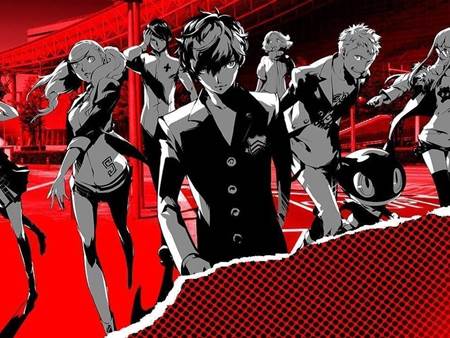
Persona 5 is a refined Japanese role-playing game. It’s been over ten years since a new mainline Persona game, and Persona 5 delivers familiar motifs with smoother, highly-stylised gameplay.
You play as a high school student who, after discovering they have the power to change the hearts of corrupt adults by exploring metaphorical palaces inside their minds, forms a group of phantom thieves with other teen victims.
What follows is an interesting anime-teen drama about rebelling against authority. Adults in Persona 5’s world are flawed and corrupt, and the teen protagonists affected by their actions struggle to come to terms with their misguided influences.
They learn to come to their own understandings through respective arcs of self-discovery.
It’s a narrative reflective of current events, cleverly and respectfully dealing with mature themes in a high school setting.
The story knows when to take itself seriously and when to be lighthearted, creating a genuine banter between the group.
The localisation team successfully brings to life the party with charming dialogue and a decent voice acting cast. Jokes are subtle but very tongue in cheek: at a DVD store, you can rent a The X-Folders box set; a party member references Bon Jovi’s “Dead or Alive;” and at school, an answer to a question about a Hawaiian Kamehameha statue explicitly mentions dragon balls.
The story has a good mix of light-hearted and quirky moments, but its attention to drama ultimately serves for an emotionally-charged story. It’s consistently entertaining and memorable.

Persona 5’s gameplay is a hybrid of traditional dungeon crawling and life-sim. Each day, you spend your mornings attending class like a normal student, with free time to spend on activities after-school and in the evenings. It’s here that Persona 5 really hooks you: every interaction with the world has a purpose. Spending time with others strengthens your relationships with them and rewards you with new abilities and insight into their character.
You can also work part-time to earn money to spend on equipment, or grind and improve your social stats. In this way, Persona 5 cleverly gives you control of player progression and character development.
You can also have a relationship with several characters but the lack of a same-sex option - especially when you can even date your teacher, is disappointing.
In fact, the game significantly struggles with queer themes. One of your party members, Yusuke, is queer-coded and the game never fully commits to his character; which makes the option to admit you like men instead of women in a conversation feel like a tease.
The only clearly-defined queer characters are used as a recurring predatory gag. Kanji’s and Naoto’s character arcs in Persona 4 are more progressive than 5’s queer representation, and that game's more than ten year's old.
That said, Persona 5 has a clear visual image carried throughout. In a genre where you spend so much time scrolling through menus and text, Persona 5 finds a way to make it fun and interesting. Every menu is beautifully animate and colourful.
The transitioning animations in and out of combat and in loading screens are incredibly seamless. Turn-based battles are animated as punchy and expressive as a Japanese animation.

Learning to exploit enemies’ weaknesses and strategising is key to combat. Going into a fight unprepared is punishing. Some enemies can instantly end your party within seconds, making later dungeons with few save points challenging and at times unfair.
Persona 5’s combat is more fast-paced and stylish than past games in the series but mostly consists of the same mechanics, bar persona negotiation. When an enemy is down, you can negotiate their freedom in exchange for wealth, an item or a new persona; and the dialogue in these scenarios is bizarrely charismatic.
Like its approach to UI, everything about combat helps characterise the party and world, further emphasised by the fantastic J-Pop/Rock soundtrack.
Persona 5 is an incredibly refined game. It demands a lot of time, energy and emotional investment, but if you’re willing to commit the over 100-hour experience, you’ll be rewarded with personally memorable moments.
If you can look past the questionable queer representation, you’ll be satisfied with an emotionally-charged story oozing with style, a fun cast of characters and a deep social role-playing mechanic.








No comments:
Post a Comment